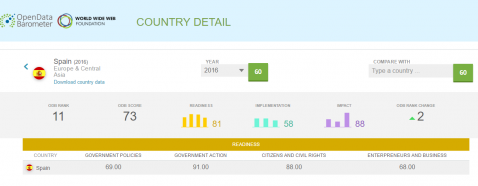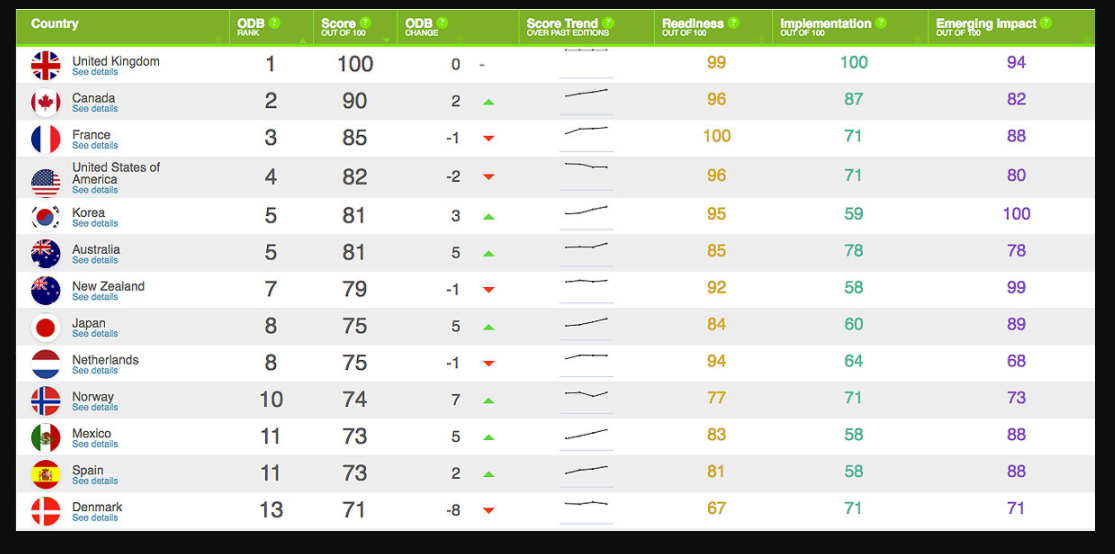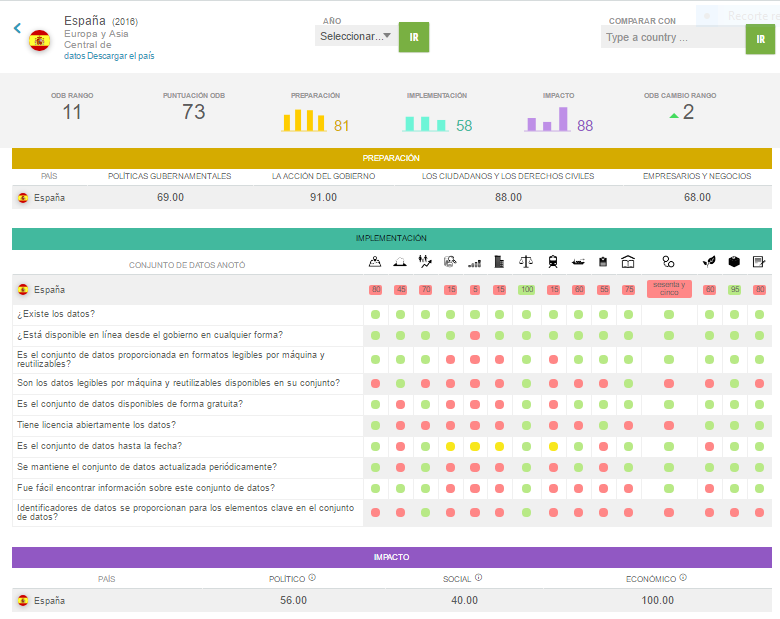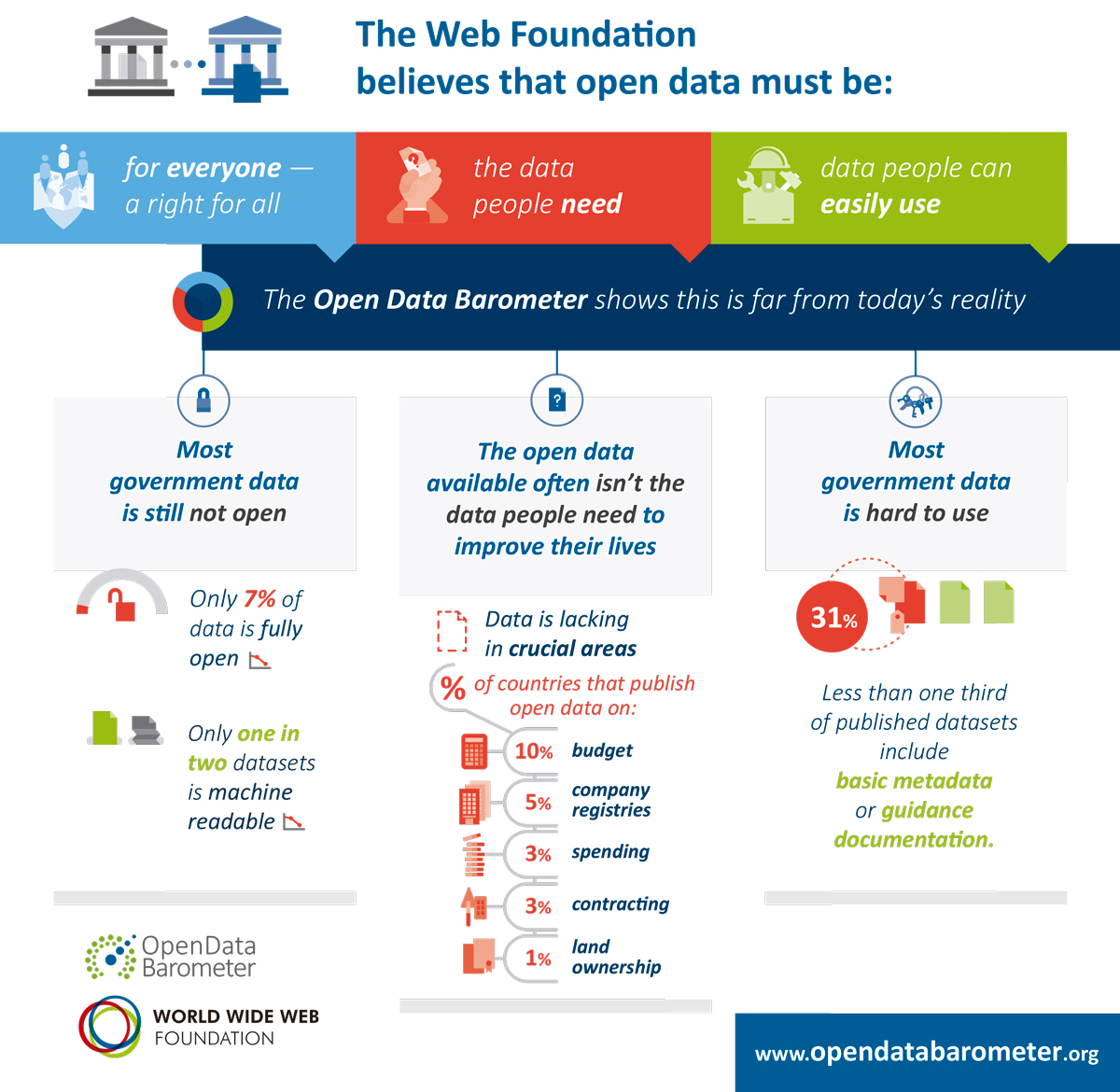Spain continues to improve its position in the Open Data world ranking
Fecha de la noticia: 01-06-2017

Spain ranks 11th in open data among a total of 115 countries, according to the latest Open Data Barometer - ODB - which has just been published. Produced on an annual basis by the World Wide Web Foundation since 2013, the Open Data Barometer is a detailed report assessing the open data policies and practices that are being developed by countries around the world. The Barometer analyzes what the governments of 115 countries of the five continents do and do not do regarding open data. To reach its conclusions, the WWW Foundation measures how governments make their data available to their citizens. It does so by using three main sources of information:
- assessment questionnaires completed by experts
- self- assessment by the government
- other data from international databases
Spain has risen continuously since the start of this international ranking, which continues to be led by the United Kingdom, and this last year has climbed two positions - from 13th in 2016 to current 11th - tying with Mexico and ahead of countries like Denmark, Germany, Sweden, Switzerland, Russia or Israel. According to this Barometer, our country is on the verge of forming part of the select club of the world top 10 in openness of data, a movement in which the leaders continue to be United Kingdom, Canada and France - which drops one position -, and which also Includes the United States, Korea, Australia, New Zealand, Japan, the Netherlands and Norway.

¿What does the Open Data Barometer measure?
The Open Data Barometer aims to determine the scope of open data initiatives around the world. It represents a snapshot of how governments are using open data for accountability, innovation and social impact. To do this, it analyzes global trends and provides comparative data on countries and regions using a methodology that combines contextual data, technical assessments and secondary indicators.
In particular, the ODB classifies governments according to:
- strength of open data initiatives
- implementation of open data programs
- impact of open data on business, politics and civil society.
The Barometer analyzes the existence and quality of 15 key datasets at national level (from land registry to government budgets, detailed census data, public expenditure, public transport schedules, international trade data, primary and secondary education performance, crime statistics, environmental statistics, election results, public contracts ...) in all the countries analyzed. It also details the degree to which data is updated, accessibility, possibility of reuse, whether free of charge, type of license, interoperability, and so on. In total ten indicators relating to 15 different sectors.
The Barometer awards Spain an average of 73 points out of 100, distributed as follows:
- 81 in 'Preparation' (prior disposition of the government, citizens and employers to ensure the benefits of open data)
- 58 in 'Implementation' (accessibility and usability of data)
- 88 in 'Impact' (evidence that openness of data has had some positive impact in the country)
In the Open Data Barometer 2016, these scores were 78 in 'Preparation', 57 in 'Implementation' and 63 in 'Impact'. It is therefore the progress in the "Impact" indicator that has driven the improvement of the position of our country during the last year. The first barometer was made with data from 2013 and since then Spain has made continuous upward progress: from the initial 48 points to the 73.38 points shown in this latest Barometer. This score puts Spain above the continental average but still below countries like Great Britain, Canada or France whose respective scores are 100, 90 and 85 points.

Quality of data versus quantity
"Governments are missing an opportunity to win trust and engage with citizens through open data”. In this report in which it has analyzed 115 countries - 23 of them for the first time - te Web Foundation informs that the top open data leaders are taking certain backward steps in the publication of open data and that 9 out of 10 government datasets are not yet open. Scores from Nordic countries and the United States have fallen this year, and even the United Kingdom, historic leader in open data, has seen troubling changes in key policies.
Open data is data that is available for citizens, companies and institutions to use and reuse. Faced with the current global crisis of confidence, governments have in data openness an opportunity to engage with citizens and regain their trust. The report finds that data on key accountability metrics - such as public spending, public procurement, corporate ownership and land ownership - are among the least open, and often are not quality data. For example, government expenditure data - which helps people understand what their taxes are invested in - are open in only 3% of countries.
Recommendations
Is there a true culture of open data in Spain? Several experts in our country point out that "there is still a way to go" and that "there is still a need to create greater awareness of civil society and to carry out an evangelizing function" in order to increase knowledge of the use of open data and to stimulate demand. The coordinator of the Barometer and expert in the matter, Carlos Iglesias, points out that there are still gaps to be overcome and features to be implemented. For its part, Access Info Europe - a pro-transparency organization that is committed to greater access to public information - emphasizes one requirement above the rest: a boost in administrative education.
Finally, the Open Data Barometer itself, in its conclusions section, makes five general recommendations for a more efficient and effective management of open data:
- Government data must be open by default.
- Governments should decentralize open data across all departments and agencies.
- Governments should adopt the Open Data Charter to ensure that open data practices are integrated above and beyond political mandates.
- Governments should consult with citizens and intermediaries regarding what data to publish first.
- Governments should invest in using open data to improve the lives of marginalized groups.

The World Wide Web Foundation
Founded by the inventor of the web, Tim Berners-Lee, the World Wide Web Foundation aims at digital equality. Through research and promotion of innovative policies and practices, this foundation works globally to ensure that the entire population can access the web and data on equal terms. The Open Data Barometer is funded by the Open Data for Development (OD4D) network and the Omidyar Network. Open Data for Development (OD4D) is a global alliance to advance the creation of open and sustainable open data ecosystems at the local level. Omidyar Network is a philanthropic investment organization that aims to create opportunities for people to improve their lives by investing in projects that catalyze economic and social change.
Full report and further information at: http://opendatabarometer.org/
The full report in Spanish can be consulted through this link or or in English here
Report also available for download (PDF)
@WebFoundation #ODBarometer #linkedopendata











